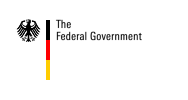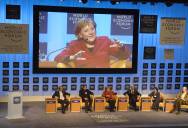Merkel underscored the importance of formulating policies aimed at helping to shape the global economy as she laid out the main priorities of her EU and G8 presidencies.
She called for flexibility and acceptance of change, saying traditional practices, legacy business forms, and vested interests will no longer guarantee success. This is the case not just in the industrialized nations. Emerging countries, too, will need to adjust to change if they want to continue to be winners.
If the right approach is taken everyone will be able to profit from globalization – in the form of jobs, export opportunities, investments, know-how transfer, and tax revenues.
Bringing double presidency to bear
Merkel stressed that growth is vital for all countries, but that it must not be based on unfair practices.
Global competition requires an international framework and it is the responsibility of governments to provide this framework. Mindful of this, Germany will place greater emphasis on global economic issues in the G8 context.
- The need to strengthen global investment opportunities.
- The need to reduce global imbalances, such as those in the currency and oil sectors.
- The need to increase the transparency of international capital markets, particularly with regard to hedge funds.
- The need to support innovation and improve protection of intellectual property.
- The need to make progress in counteracting climate change and increasing energy efficiency.
New dialogue with emerging countries
Merkel said only a united front on the part of the G8 will help make it possible for emerging economies to participate in global responsibility.
She will seek to launch new forms of dialogue with Brazil, India, China, Mexico, and South Africa at the G8 summit in Heiligendamm. This process would then be continued in other international institutions.
Focus on Africa
The promotion of investments in Africa as well as more growth and employment on the neighbouring continent are a further focus of the G8 Presidency.
African countries must be treated as equal partners in matters regarding the exploitation of their natural resources, Merkel said.
At a conference in September an assessment is going to be made of G8 activities in the fight against AIDS and other infectious diseases. If necessary, new initiatives will be launched. Special attention is to be given in this context to the need to protect the health of women and children.
Moving forward with the liberalization of world markets
The openness of world markets is an absolutely necessary prerequisite for global growth. Trade barriers must be reduced. Merkel called for flexibility on the part of all the countries involved in the current round of World Trade Organization talks (Doha Round).
She sees a chance of success in the foreseeable future and expressed hope that constructive talks will be conducted to this end in Davos. Failure of the Doha Round, Merkel said, would be a bitter setback.
Strengthening transatlantic trade relations
Merkel wants to strengthen transatlantic cooperation. She sees potentials for lowering non-tariff trade barriers in areas such as technical standards, financial market rules, or energy and environmental regulations with resultant cost reductions on both sides of the Atlantic.
She stressed that this initiative is not directed against anyone and invited every country interested in promoting free trade to take part in it.
The World Economic Forum is being held from January 24 to 28. The theme this year is "The Shifting Power Equation". Around 2,000 representatives of business, government, and civil society from more than a hundred countries are expected to attend.
Klaus Schwab, a German professor of economics, came up with the idea for the forum at the beginning of the 1970s. The intention was for business leaders to come together and talk in an informal atmosphere. The first meeting took place in 1971 and was attended by around four hundred European top managers.
Klaus Schwab, a German professor of economics, came up with the idea for the forum at the beginning of the 1970s. The intention was for business leaders to come together and talk in an informal atmosphere. The first meeting took place in 1971 and was attended by around four hundred European top managers.

